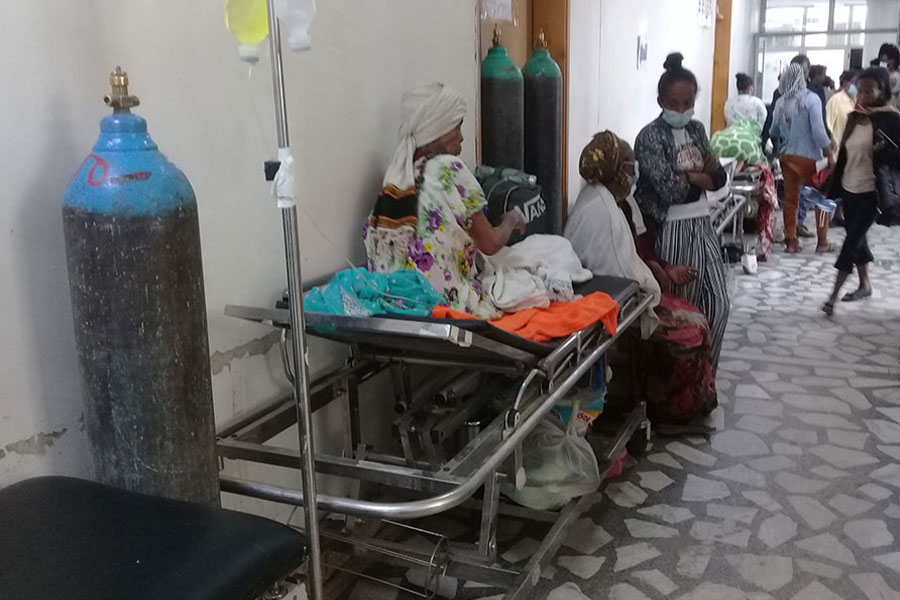
Viewpoints | Apr 20,2024
Jun 20 , 2020
By Eden Sahle
There is a friend of mine who knows about sleep deprivation like no other. Working double shifts and sleeping on wooden benches, he is one of those strong men and women on the front line of the fight against the Novel Coronavirus (COVID-19) pandemic. Our healthcare professionals are putting their lives on the line to save the lives of others each day with the lack of even the most basic infrastructure.
For my friend, the COVID-19 pandemic means the disruption of his previous practice, where he cared for a single patient at a time. Now he has to engage with multiple patients at a time in a public health institution.
Making that sort of abrupt change is not easy for him and his colleagues who have had to adapt to ever-changing unpleasant new realities. They were not expecting to contend with a flood of patients. It is not just new COVID-19 patients who are impacted but others that have been affected with the strain put on the healthcare system.
Even under normal circumstances, our medical professionals are expected to deliver more than their training prepares them for. They are not provided with adequate medical gear and equipment, they face high rates of infection, and the stress that comes from dealing with patients in pain is often exhausting and distressing. Apart from a lack of facilities, the grossly inadequate number of medical doctors has added to the burden.
The COVID-19 outbreak is especially taxing. It often involves working in an environment where not enough is known yet about the illness, but health professionals are expected to meet expectations with a similar level of effectiveness. The emotional and psychological impact takes its own toll, as their exposure to the virus negatively impacts their social life.
We all may be living in uncertain times, but it is truer of these professionals. Society owes them a debt of gratitude for the resilience and dedication to their profession. Without them, we will not be able to defeat the pandemic.
As the number of cases has been rising over the past month, with daily rates having reached three digits, the best way we can still keep ourselves safe is by protecting ourselves from the disease.
Although we may not have the medical skill to treat patients, we have hard-wired humanity in all of us to be there for one another and to appreciate those who are helping the country. We should all go beyond our comfort zone and cope with the lifestyle changes the pandemic has brought.
Certainly, the pandemic is a new aspect in our lives that is largely out of our control. Until these professionals can come up with an effective enough treatment, it will be out of our control.
There are already promising clinical trials taking place at the moment. One of the most promising seems to be Dexamethasone, a low-dose steroid treatment that has been seen to cut deaths by a third for patients on ventilators and a fifth for those on respirators.
What this shows us is that the pandemic will come to an end, and we will once again venture outside without fear. What is expected of us is patience to stay put, while our health professionals save the lives of those who have unfortunately contracted the disease.
We also do not know whether after the pandemic life as we knew it might be significantly different. We may reassess our values and institutions. Most likely, we would attempt to look after our environment better and work to strengthen our health system, including providing healthcare professionals with the resources they need. The silver lining might be that we will come out of this fairly committed to caring for our doctors and nurses, in much the same way they took care of us in our time of need.
PUBLISHED ON
Jun 20,2020 [ VOL
21 , NO
1051]

Viewpoints | Apr 20,2024

Radar | Jun 11,2022

Commentaries | Sep 06,2025

Fortune News | Oct 24,2020

Radar | Dec 17,2022

Sunday with Eden | Nov 27,2021

Radar | May 21,2022

Radar | Apr 03,2023

Commentaries | Jun 07,2020

Viewpoints | Jun 22,2024

Photo Gallery | 175178 Views | May 06,2019

Photo Gallery | 165403 Views | Apr 26,2019

Photo Gallery | 155705 Views | Oct 06,2021

My Opinion | 136783 Views | Aug 14,2021

Dec 22 , 2024 . By TIZITA SHEWAFERAW
Charged with transforming colossal state-owned enterprises into modern and competitiv...

Aug 18 , 2024 . By AKSAH ITALO
Although predictable Yonas Zerihun's job in the ride-hailing service is not immune to...

Jul 28 , 2024 . By TIZITA SHEWAFERAW
Unhabitual, perhaps too many, Samuel Gebreyohannes, 38, used to occasionally enjoy a couple of beers at breakfast. However, he recently swit...

Jul 13 , 2024 . By AKSAH ITALO
Investors who rely on tractors, trucks, and field vehicles for commuting, transporting commodities, and f...

Oct 18 , 2025
The political establishment, notably the ruling party and its top brass, has become p...

Oct 11 , 2025
Ladislas Farago, a roving Associated Press (AP) correspondent, arrived in Ethiopia in...

Oct 4 , 2025
Eyob Tekalegn (PhD) had been in the Governor's chair for only weeks when, on Septembe...

Sep 27 , 2025
Four years into an experiment with “shock therapy” in education, the national moo...

Oct 18 , 2025 . By NAHOM AYELE
In a sweeping reform that upends nearly a decade of uniform health insurance contribu...

Oct 18 , 2025 . By BEZAWIT HULUAGER
A bill that could transform the nutritional state sits in a limbo, even as the countr...

Oct 18 , 2025 . By SURAFEL MULUGETA
A long-planned directive to curb carbon emissions from fossil-fuel-powered vehicles h...

Oct 18 , 2025 . By BEZAWIT HULUAGER
Transaction advisors working with companies that hold over a quarter of a billion Bir...